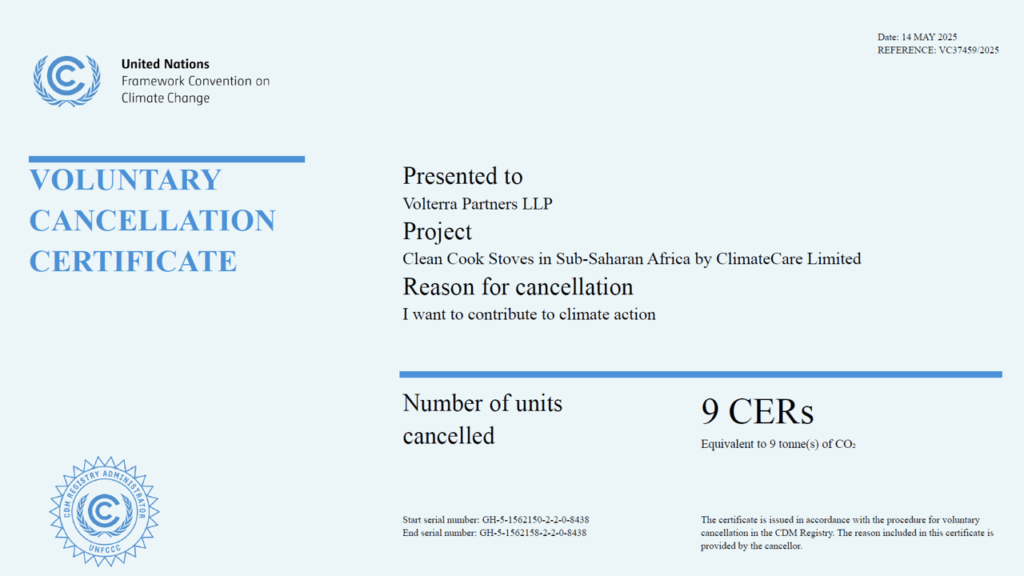Carbon Reduction Plan
In June 2019, with the Climate Change Act 2008 (2050 Target Amendment) Order 2019, the Government committed to a 100% reduction of greenhouse gas emissions by 2050 compared with 1990 levels. This is referred to as the net zero target.
This Carbon Reduction Plan presents Volterra’s commitment to achieving net zero by 2040, exceeding the UK Government’s ambitions for emissions reductions.
We reported our carbon emissions for the first time in 2023. These form our baseline for future carbon emissions reporting.
This Carbon Reduction Plan measures and reports 2024 emissions against the 2023 baseline. Our reporting is for each calendar year.
Recognising that climate change is one of the most pressing issues of our time, we are committed to:
- achieving net zero emissions by 2040.
- reducing our emissions by 40% by 2030.
- maintaining carbon neutrality (or positivity) each year by offsetting all residual emissions not mitigated.
- Publicly reporting our progress each calendar year.
Scope of emissions monitoring
Scope 1
Direct greenhouse gas emissions that occur from sources that are owned or controlled by Volterra.
Scope 2
Greenhouse gas emissions from the generation of purchased electricity consumed by Volterra.
Scope 3
Other indirect emissions that are a consequence of Volterra’s business activities, e.g., travel to our offices and to meet clients.
Summary of scope of emissions monitored
Scope 1
None applicable
Scope 2
On-site energy usage
Scope 3
- Employee energy used when home working
- Business travel
- Employee commuting
The methodology for calculating our carbon footprint is based on the fact that our operations are primarily administrative and that our facilities are managed by an external party.
Emissions footprint
Volterra’s carbon footprint for 2024 is estimated to total 8.74 tCO2e.
This is approximately equal to emissions generated by 2 UK households in a year.* The largest contribution is emissions generated through business travel.
Our 2024 emissions are 0.9 tCO2e higher than 2023.
The increase has been driven by our increased staff; our 2024 emissions are equivalent to 0.52 tCO2e per staff member, marginally below 2023 emissions per staff member of 0.54 tCO2e.
*Each household with 2.4 persons on average
| Emissions Type | Total emissions (tCO2e) 2024 | Total emissions (tCO2e) 2023 |
|---|---|---|
| Scope 1 | 0.00 | 0.00 |
| Scope 2 | ||
| Purchased Electricity | 1.00 | 0.70 |
| Scope 3 | ||
| Home Working | 3.49 | 3.16 |
| Business Travel | 3.63 | 2.91 |
| Employee Commuuting | 0.60 | 0.73 |
| Purchased Goods (Cloud Storage) | 0.02 | 0.02 |
| Total Emissions | 8.74 | 7.52 |
| Emissions Per Staff Member | 0.52 | 0.54 |
Volterra is net carbon positive
We offset our 2024 carbon emissions through the purchase of carbon offsets supported on the United Nations Carbon Offset Platform.
We are aware of the shortcomings of carbon offsets and acknowledge that purchasing them is neither a perfect solution for businesses to achieve carbon neutrality, nor does it diminish Volterra’s mission to lower emissions. We understand concerns related to the additionality of carbon offsets and potential displacement of local communities in certain carbon offset projects.
We believe that purchasing carbon offsets for meaningful climate projects is better than not contributing at all, and should be supplemented with other efforts to reduce emissions and enforce climate-conscious practices in our workplace, wherever possible.
Our aim was to contribute to a project that would have a direct, first-hand impact on human lives, in line with the principles we follow in our work – prioritising community needs. We also wanted the project to result in lower involuntary relocation and displacement of local communities.
On this basis, Volterra purchased nine tonnes worth of carbon offsets for CookClean – a social enterprise that provides energy-efficient cooking stoves to households in Sub-Saharan Africa, thus preventing the severe environmental and health issues that result from traditional, less efficient cooking stoves.
We aim to offset our carbon emissions each year in a similar manner, while also progressing our internal initiatives to lower our emissions first-hand.

Emission reduction ativities
Steps we took in 2024
Last year, we undertook multiple steps to raise environmental awareness, practice climate consciousness and reduce emissions at our workplace:
We opted out of automatic timers on the air conditioners and heating. This has allowed us to align the operation of these devices with staff needs and avoid wasting energy when our workplace is empty.
We have obtained access to real-time energy dashboard that allows us to track our daily usage and reflect on our energy consumption during consumption spikes.
We encouraged waste segregation among our employees by introducing separate bins by different types of waste generated. Waste segregation is now a permanent practice at our workplace.
We have significantly increased our involvement in sustainable and renewable energy projects since 2023.
Steps for the future
We are expecting our workforce to grow in future years. This will make achieving our targets difficult. To do so, we have outlined a range of emissions reduction measures within our Social Value Strategy. These include:
Continue to procure 100% renewable electricity.
Promote active travel commuting measures, including through our cycle to work scheme.
Implement office energy reduction measures (e.g., smart plugs).
Upgrade to more efficient equipment when replacing worker and office tools such as laptops.
Recycle and donate equipment not in use with local charities and/or recycling organisations.
Encourage energy reduction via cloud storage optimisation.
Continue to recycle and segregate waste, monitor energy usage, be mindful of business-related travel and promote projects in sustainable development.
Reduce business travel, particularly travel by air and private vehicle, through effective measurement and a sustainable travel first policy.
